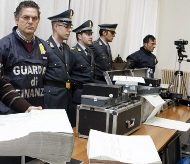Italy: More Indictments in Photo Radar Scandal
Italy’s financial police, the Guardia di Finanza, announced in Brescia last week the indictment of five individuals suspected of a 13 million euro (US $18 million) scheme involving tax fraud and rigged speed cameras. Diego Barosi, 60, the head of the Garda Segnale Srl photo enforcement firm would bid on municipal automated ticketing machine contracts against shell companies run by his co-conspirators. They would ensure that Garda ended up landing the lucrative deal.
Barosi used about fifty speed cameras, but only two of them were properly calibrated and certified. When a motorist received a citation in the mail, the serial number on the ticket would be from one of the two certified units. The camera actually used was rigged to display speeds fifteen percent higher than actual. This created a significant amount of profit as the contracts gave Barosi’s firm forty percent of each ticket he was able to issue.
Barosi and his colleagues used these profits to buy real estate through the shell companies. So far, investigators have seized fifty-one properties worth 2.5 million euros (US $3.5 million). The consumer watchdog group Codacons pointed out that this situation is so extraordinary that the government must intervene to order the cancellation of license points and the refund of 11.5 million euros (US $16.3 million) in fines collected from 81,555 motorists.
“Many consumers not knowing that the penalties were illegal and equipment rigged paid the fines and can no longer appeal to the prefect nor the judge, because the 60 day notice period has passed,” Codacons stated in a news release. “The rule that is intended to give legal certainty, but it is absolutely unfair in cases like this where we discover in retrospect that people have been cheated.”
Investigations into Italian speed camera fraud have been in the works for years. Several raids were conducted in 2009. In August, speed cameras were shrouded in black plastic as up to 200 officials faced charges in Caserta. In January, the carabinieri arrested red light camera maker Stefano Arrighetti and seized automated ticketing machines from 54 municipalities that used the “T-Red” brand of intersection camera on charges of contract irregularities and the shortening of yellow light timing at intersections.
[Courtesy: Thenewspaper.com]
More by The Newspaper
Latest Car Reviews
Read moreLatest Product Reviews
Read moreRecent Comments
- Bd2 Hyundai and Kia have zero problem selling their respective Ioniq and EV models at or above MSRP. EV9 is the top seller in it's segment.
- Redapple2 366,000 miles is no small thing. The owners and the manufacturer: tip o the cap.
- ToolGuy The 6 million residents of Missouri purchase twice as many Tesla vehicles as do the 5 million residents of Alabama. So now you know.
- Redapple2 1 Hybrid will be a no go for me. Engine shake on start is more than most.2 I like the '24 better. I like distinct headlights. Grill. New Rear is blob like. '24 lobster claw rear may not appeal to all but at least it attempts style.3 Everything in the TV screen? No thx. Xmode selection. Seat heat. Cabin temp and more, Go to the Screen.4 '25 rides great? The '24 made Consumer Reports short list of best riding cars on sale.5 Gold wheels cool. Not cool? floating roof d pillar slash. Heat extraction gills at the front brake.Hard Pass. I ll keep my 24 Limited til the wheels come off.
- Jeff S I have seen a number of new Teslas around where I live. Maybe the increased number is because Tesla has reduced the price on some of their models.


































Comments
Join the conversation
How did you expect Berlusconi to pay for his under-aged girlfriends?